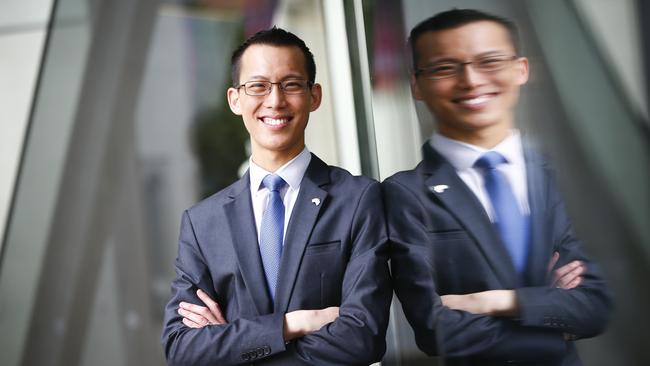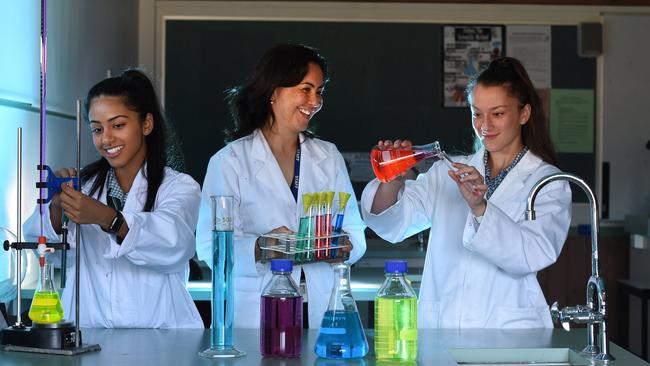We need to lift, not lower, teacher standards
LOWERING the bar to open the profession to dimwits is not the way to fix our looming teacher shortage, writes Kylie Lang. We need to encourage the best of the best into teaching.
Rendezview
Don't miss out on the headlines from Rendezview. Followed categories will be added to My News.
THE way to attract more people to teaching is not to lower the bar so that any dimwit can front a classroom, whether or not they can spell or add up.
And it is not to bring in teachers from overseas in a band-aid measure likely to appeal to duds. Can you imagine top professionals from Finland or Singapore, which lead the world in education, coming to Australia for what we offer our people? Me neither.
As a teacher shortage looms, with enrolments in education degrees falling by one-quarter, we have to find sensible, sustainable solutions.
If we are truly serious about valuing education, three things have to happen.
Teachers must be better trained, better supported, and respected.
In Finland, which consistently outperforms Australia and most OECD countries, competition to study teaching is fierce. Only one in 10 applicants is accepted.
Contrast that to Australia, where teaching is sadly viewed by many as a fallback option, particularly for men.

At the Brisbane campus of Australian Catholic University, school leavers need an OP17 — which means barely passing subjects and probably failing a few — to get into its four-year Bachelor of Education (Primary).
Over at Queensland University of Technology, which has taken the terrific step of requiring would-be teachers with a three-year science, maths or arts degrees to complete an additional two-year Master of Education, students are dropping like flies.
They prefer the previously quicker, 12-month teacher training course.
Nationally, enrolments are down also because of a new entry requirement that future teachers pass English, maths and science in Senior. That’s it? Why are we not insisting on As and Bs instead of settling for satisfactory?
The smarter the teacher, the better the outcome for students.
As leading British educationalist Dylan William says: “The only variable in teachers that is consistently associated with student progress is teacher IQ.”
Emotional intelligence is vital too — caring about students, being warm, empathetic and encouraging — but it is not enough.
In Finland, all teachers hold a Master’s degree. Before they are accepted into university with their exceptional grades, they are also assessed on their ability to think critically and their aptitude for teaching.
High quality teachers are the hallmark of Finland’s education system, observes the Centre for International Education Benchmarking in the US.
“Teaching continually ranks in opinion polls as Finland’s most admired profession,” the centre says.
“The attractiveness of teaching likely has much more to do with the selection process, the work itself, and the working conditions than teacher pay (which is similar to that in many other European countries) or simply respect for teachers.
“Finland is also at the frontier of curriculum design to support creativity and innovation, which means teachers have an attractive job resembling other high-status professions, involving autonomy, collaboration, research, development and design.”

Critically, Finland is also willing to trust teachers and their professional judgments.
Not surprisingly, the nation has a high retention rate for teachers, with 90 per cent remaining in the profession for their working life.
Compare that with Australia, where burn out is rife, particularly in the first five years, where increasing demands are dumped on teachers without consultation, and the profession is no longer considered “noble” but undervalued.
Throw into the mix a lack of discipline and care in the home — many kids come to class unprepared to learn, be they hungry, hyped up on junk food, sleep-deprived or otherwise disruptive — and you have to wonder why anyone at all is entering teaching these days.
One primary teacher of 35 years, who has requested anonymity, tells me the situation is dire, with parents largely to blame.
“The curriculum overload is just a minor problem compared to the parenting,” she says.
“We see it range from disinterest, neglect to entitled. The consistent lack of connection or involvement in learning by some parents is almost the norm at some schools.
“I’ve witnessed children who don’t know which way up a book goes in Prep and some cannot speak properly. The lack of physical activity is obvious due to very poor fine and gross motor skills. The lack of nutrition is shown by the packet upon packet in their lunch boxes.
“The number of children with emotional and social needs is escalating at an enormous rate. Once upon a time, it was one or two, now it’s more like half.”
She says many teachers “vote with their feet and leave”.
“I work very long hours as do many of my colleagues, and I can manage and motivate the difficult students as I’m so experienced, but I feel for the graduates and other young teachers who don’t have that experience.
“Some students have so many layers of dysfunctional human behaviour as their role models from birth, it’s like we take one step forward, the weekend happens, and then two steps backwards.
“All we want is to be supported so the well-behaved, kind, considerate, mature students can learn uninterrupted ... yes, even they deserve an education.”
She’s right. All students deserve a good education.
Attracting and retaining quality teachers demands that we lift our standards, not lower them.
Kylie Lang is a Courier-Mail associate editor.



